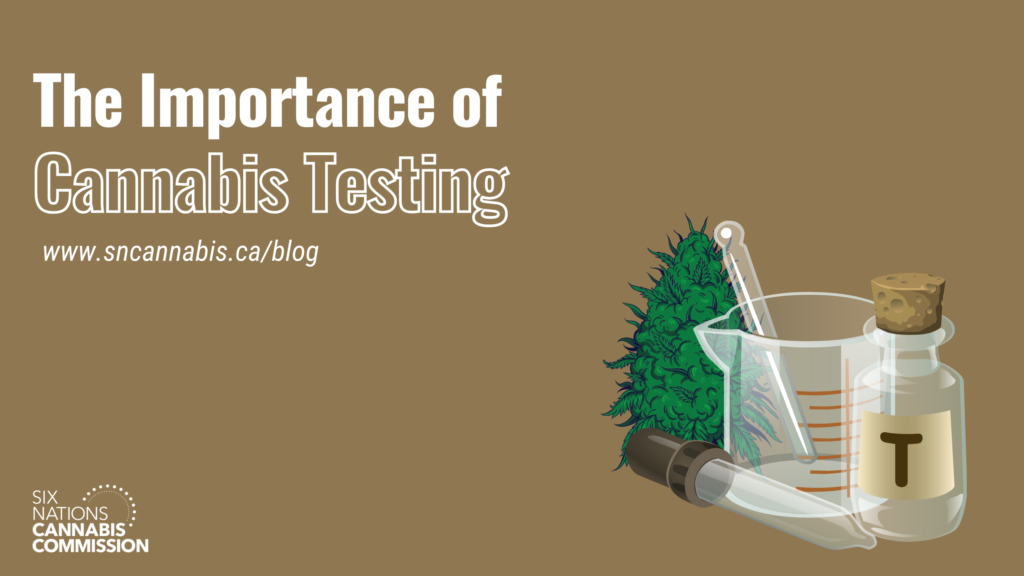
With the Six Nations of the Grand River (“SNGR”) enactment of the Six Nations Cannabis Control Law (“SNCCL”) and Six Nations of the Grand River Cannabis Control Regulations (SNGRCC) to regulate cannabis on its territory, cannabis has continued to grow in popularity and usage in the community. The SNGR is seeing an ever-growing number of users, those who are seeking safe and accessible cannabis.
Cannabis testing is the best and only way to ensure that cannabis is safe for consumption, but can be unknown to consumers and is often overlooked by the manufacturers and retailers of the unregulated market. As cannabis usage grows in the SNGR and more of its members are seeking to try it for their first time, it is essential that trustable premium testing is certifying the safety and information of the products going into the hands of the community.
With the testing of cannabis products being a part of the SNCCL, the SNCC thoroughly believes in the importance of it and advocates for the practice, as it makes cannabis safer for the community of the SNGR. Separating itself from the members of the unregulated cannabis industry, the SNCC promises that all licensed cannabis manufacturers will test their products before sale or face consequences.
Not convinced? Continue reading to learn about the reasons that prove the importance of cannabis testing.
Ensures the Health and Safety of Consumers
To being with, there is no such thing as a safe ready-to-sell cannabis product if it has not gone through rigorous testing that has been approved by some sort of regulatory body. The process of getting cannabis into the hands of consumers is lengthy; from growing, cultivating, processing, and packaging- cannabis faces the possibility of contamination countless times.
Just like other plants, cannabis is susceptible to the absorption of the elements in its environment. Acting like a sponge, cannabis can hold onto containments found in soil and plant treatments such as heavy metals, pesticides, solvents, and processing chemicals. In addition, cannabis is not free from the risk that other plants face such as growing mold, mildew, microbes, and mycotoxins.
The listed substances are what you can expect to be monitored in cannabis testing to verify are under a level that makes them safe for human consumption. If such contaminants are in fact consumed, they pose a risk to the health of consumers threatening their immune system which is especially dangerous for those consumers with respiratory issues, allergies, or who are immunocompromised individuals.
There have also been reports of unregulated cannabis being exposed to containments of other drugs, these containments can be fatal for consumers who believe they’re only getting cannabis. At a minimum, the risk of illicit drug containments will provide an unwanted experience for users that isn’t true to that of cannabis. This risk is no stranger to the Six Nations community, as it has seen proof of illegal dispensaries that were caught with cocaine residue. It is the goal of the SNCC to ensure members of the community will never have to worry about the possibility of illicit drugs contaminating the cannabis they purchase and consume.
Testing ensures that the cannabis is free of any dangerous contaminants that can harm the consumers, certifying it as a safe product for human consumption. The SNCC does not permit the sale of any cannabis product that has not been tested and proven safe before packaging, giving the SNGR community access to safe cannabis products.
The SNCC is setting the precedent for the level of cannabis health and safety standards by following the SNCCL and enforcing licensed manufacturers to follow the laws on testing their products, before they’re approved and ready for sale. The SNCCL is harmonized with key elements of the Cannabis Act and Cannabis Regulations (Canada), the Cannabis License Act (Ontario), and the Cannabis Control Act (Ontario), particularly regarding health and safety in which testing plays a crucial role.
With the first key guiding principle of the Commission being Protection of Health & Safety, testing cannabis products is a crucial procedure to guarantee the principle is upheld to the highest standard possible.
Testing Provides Manufacturers with Critical Data
Licensed cannabis manufacturers have a responsibility to not only safeguard the health and safety of their consumers by testing their products but to also test the potency of their products to ensure the quality is consistent. The SNCCL says that licensed manufacturers are to test for the concentrations of the following phytocannabinoids that make up part of cannabis products: THC, THCA, CBD, and CBDA (SNGRCC, Division IV: Testing). These phytocannabinoids are what create the effects of cannabis products, especially ones that isolate a specific one such as CBD-only edibles.
For customers to rely on the product to provide the experience they are looking for, the testing of phytocannabinoid levels helps manufacturers better understand the make of their products in order to keep them consistent and high quality.
It should also be mentioned that testing for other phytocannabinoids such as CBN, CNBA, CBG, and CBGA are being tested more often and are part of a class of cannabinoids that have been more recently discovered. Their discovery is thanks to the legalization of cannabis which has allowed for more regulated scientific studies to occur. These phytocannabinoids too can provide different experiences for consumers, especially when isolated into cannabis extract products.
The terpene profile of cannabis products is also testable, as individual terpenes also have the potential to change the experience of the consumer. Alone, terpenes aren’t intoxicating and are found in every plant. Research on how terpenes affect the experience of cannabis consumers is ever-growing, but in the meantime tested levels can still provide cannabis connoisseurs with a direction of what product they want to purchase.
Cannabis is an intricate plant made up of many different components, all of the components that have been discussed are part of the critical data that manufacturers either need or desire to know in order to deliver the quality of the product that their consumers are looking for.
The SNCC wants to create a cannabis industry within the SNGR that provides members of the community with easy access to the cannabis products they want. By enforcing their licensed manufacturers to test their products it provides consumers with the information that can point them in the direction of what to purchase.
Conclusion
As clearly outlined in this blog post, testing cannabis is an important practice for the industry for both consumers and manufacturers. It is safer, provides important data, and ensures it meets a standard set by whatever regulatory body it may fall under. Consumers of cannabis products should only ever purchase and consume products that have been certified and tested, in order to protect their own health and to make sure they are fully aware of the dosage they are consuming.
It is specifically important for the legal cannabis industry of the SNGR to practice testing, as the unregulated cannabis industry in the area has been linked to other illicit drugs. With the SNCC enforcing the testing of cannabis products, the community will have access to cannabis products they will never need to question the safety of and will be provided with certified information on their purchases.

